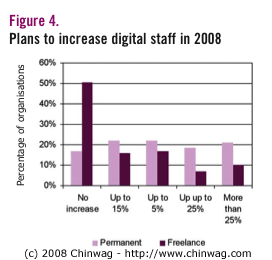Chinwag Jobs Digital Skills Survey 2007 Report
Background
Is there a dearth of candidates in the digital industry? Is it hindering the growth of the sector? And what do employers, recruitment consultants and HR professionals think is going to happen this year?
Chinwag Jobs undertook a survey in late 2007 to investigate the digital staffing space and the industry's view of 2008. This report details the findings.
![]() This
report is also available to download as a PDF (2.5Mb).
This
report is also available to download as a PDF (2.5Mb).
Registration required (it's free though).
Index
- Background
- Executive Summary
- Research Results
- Conclusions
- Direct Comment from the Industry
- Methodology
- About Chinwag Jobs
Executive Summary
- It's hard to attract staff:
- 97% of respondents find it either difficult or impossible to attract the
right digital staff for their businesses
- It's difficult to retain staff:
- 76% of respondents find it difficult to retain staff within their companies.
- Digital staff numbers are growing:
- Most businesses have increased the amount of staff working in digital
during the last year, with more permanent staff joining than leaving.
- Use of freelancers is growing:
- Businesses have found themselves using the services of freelance staff
more this year on previous years.
- The digital skills shortage is stopping businesses grow:
- 57% of respondents reported that the digital skills shortage impeded the
growth of their business in 2007.
- Salary is a major issue in attracting and retaining digital staff:
- Companies having most difficulty attracting staff are also the least
likely to raise wage levels next year.
- Most companies giving pay rises in 2008:
- 75% of businesses are planning to increase the salaries of digital
staff.
 Research Results
Research Results
Companies from a range of sectors were asked about their digital departments. The greatest number of responses came from marketing agencies, media companies, recruitment consultants, online businesses and the IT sector.
Upon reviewing the survey results, it was noted that the nature of the business responding has an impact on the answers given. The graph below displays the breakdown of digital section size (Figure 1). Over half had fewer than 15 members of staff within their digital teams.
There is a correlation between sector type and digital department size. Media, marketing and online organisations have comparatively larger digital departments whereas industries such as manufacturing have smaller digital teams.
Attracting and Retaining Staff
Recruiting suitably qualified digital staff is a problem for the majority of organisations.
Only 3% of respondents reported finding appropriate staff to be easy. Most found recruitment difficult, either somewhat or very, and some even reported that they find it impossible. See Figure 2: Difficulty in attracting qualified digital candidates
 The level of difficulty in attracting staff varies by industry; with recruitment agencies and online business reporting fewer difficulties than other sectors. Conversely technical and marketing agencies find it harder on average to recruit than other sectors.
The level of difficulty in attracting staff varies by industry; with recruitment agencies and online business reporting fewer difficulties than other sectors. Conversely technical and marketing agencies find it harder on average to recruit than other sectors.
This is likely to be due to level of skills needed in these different industries, the more cutting edge technical knowledge and amount of new skills appearing aren't being covered in traditional education and courses.
The biggest problem reported in the digital industry was recruiting staff, which outweighed keeping staff in the company once employed. However, 76% of companies still found it difficult to retain staff (See Figure 3).
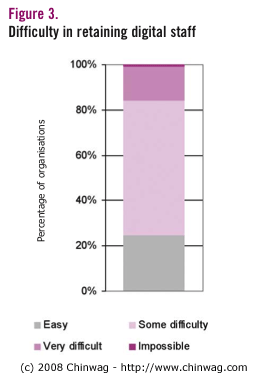 Retaining digital staff is especially hard in the finance, consumer and leisure industries and for online business and technical agencies.
Retaining digital staff is especially hard in the finance, consumer and leisure industries and for online business and technical agencies.
Staff retention is less of a problem for the retail, travel and design sectors.
Marketing and recruitment businesses experienced average levels of digital staff retention difficulties reported within the survey.
Staff Turnover and Composition
Figure 4 shows the respondents expected levels of permanent and freelance staff in 2008.
Permanent Staff
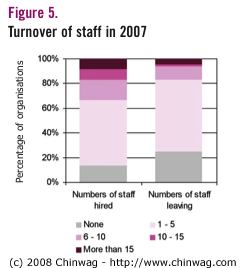 Most companies reported higher numbers of people joining their digital departments than leaving them.
Most companies reported higher numbers of people joining their digital departments than leaving them.
Companies who did no recruitment outnumbered those who didn't lose any staff. Therefore the majority of companies have grown in number of staff in 2007. This is shown in the graph below (Figure 5).
Figure 6 shows that turnover of staff varied by sector. Recruitment, marketing and professional industries had the least amount of staff turnover, implying that during 2007 these industries in particular have sought to expand their digital services.
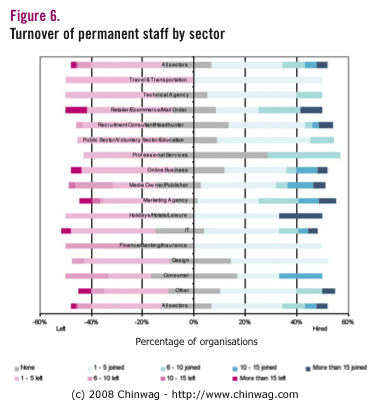
The overall staff increase is not likely to continue for the majority of recruitment agencies, who report no plans to increase the number of permanent digital staff.
Technical agencies, designers and marketing agencies are predicting the largest level of permanent staff increase.
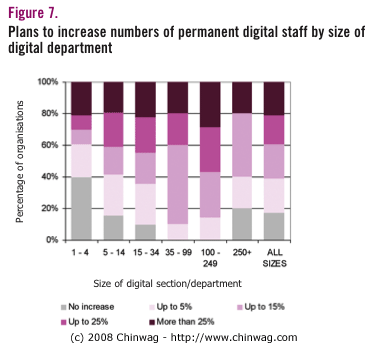
The survey results indicated that the size of their digital team has an impact on plans for expansion. This can be seen from the graph below - the smaller a digital team is, the less likely it is to be expanded in the coming year.
This trend does not extend to very large companies which are planning less expansion than smaller companies, according to the survey.
Freelance Workers
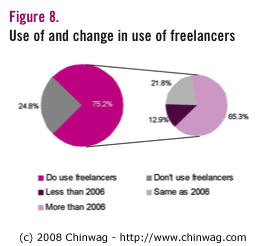 75.8% of the organisations surveyed used freelance or contracted workers.
75.8% of the organisations surveyed used freelance or contracted workers.
Companies were also asked to report whether their use of freelance workers increased this year on the previous year. Figure 8 shows few organisations reported a decrease in the number of freelancers employed - in fact 65.3% reported an increase.
This increased need for freelance workers is particularly true of the travel, leisure and retail sectors.
The increased need for freelance workers in the recruitment, marketing and technical sectors all fell within the survey's average response.
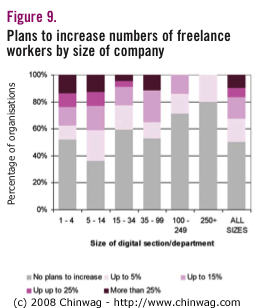 However this trend of increasing freelancer requirement is not universally predicted to continue on into next year; half of companies are not expecting to use more freelance staff (see
Figure 9).
However this trend of increasing freelancer requirement is not universally predicted to continue on into next year; half of companies are not expecting to use more freelance staff (see
Figure 9).
This may reflect the desire of companies to find permanent members of staff.
However, even these companies are expecting to require the same amount they are using this year
IT, marketing and technical sectors all predicted the largest increases.
Figure 9 indicates that the size of the digital department has an impact on the perceived need for freelance workers.
Smaller departments reported the highest increases in demand. This is the opposite of the trend seen for permanent staff, supporting the idea that larger companies are keener to broaden their departments with full time staff whereas smaller departments seek the help of freelance on a more ad hoc basis.
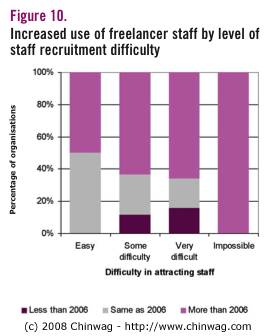 The fact that most companies find it difficult to attract qualified digital staff is reinforced by so many companies seeking increased help from freelance workers.
The fact that most companies find it difficult to attract qualified digital staff is reinforced by so many companies seeking increased help from freelance workers.
Figure 10 highlights that the more difficulties companies experience in recruiting staff, the greater the use of freelancers in 2007 from 2006.
For the coming year, the reverse is true.
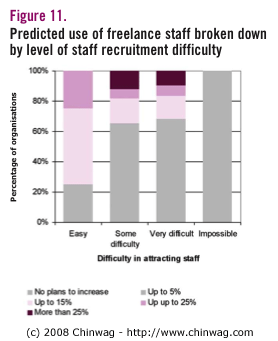 Figure 11 shows that when companies have more difficulty in recruiting staff, the less likely they are to increase the amount of freelancers used in the following year.
Figure 11 shows that when companies have more difficulty in recruiting staff, the less likely they are to increase the amount of freelancers used in the following year.
This suggests that businesses are experiencing problems attracting appropriately qualified staff from both the permanent and freelance pools.
Growth of Business
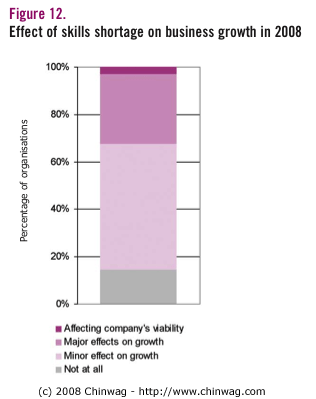 Having reviewed the how easy or hard businesses found they were able to attract staff, they were then asked the impact of recruitment on the growth of their business.
Having reviewed the how easy or hard businesses found they were able to attract staff, they were then asked the impact of recruitment on the growth of their business.
The skills shortage experienced this year affected the growth of 57.4% companies asked. It particularly affected the professional services, online, design and technical agency sectors.
Companies were also asked to predict what the effect of the skills shortage will be on the growth of their business in 2008.
• 85.6% of companies believed that the shortage will have some kind of negative impact on their business' growth.
• 30% of respondents thought that these effects would be very large.
See Figure 12.
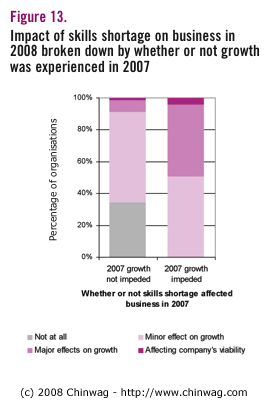 This is not just a short term feature of the market. As
Figure 13 displays, there is a correlation between staff shortage experienced last year and predicted shortages in 2008.
This is not just a short term feature of the market. As
Figure 13 displays, there is a correlation between staff shortage experienced last year and predicted shortages in 2008.
Companies which have already experienced growth problems are more likely to do so again next year.
The direct link between recruitment problems and growth of business is established statistically in
Figure 14. The graph shows that 20% of companies experiencing staffing problems believe the staff shortage will affect the future viability of the business.
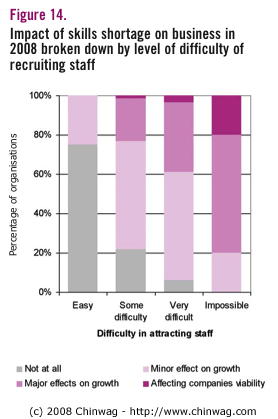
Wages
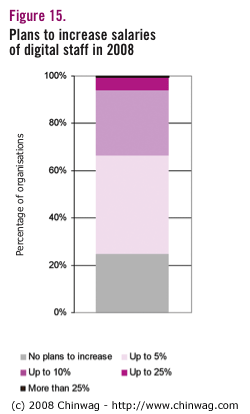 75.3% of companies questioned planned to increase the salaries of their digital staff in 2008 (See
Figure 15). However, under half of these planned to raise them significantly above inflation.
75.3% of companies questioned planned to increase the salaries of their digital staff in 2008 (See
Figure 15). However, under half of these planned to raise them significantly above inflation.
The survey found that companies which find it most difficult to attract qualified staff are also least likely to be raising their staff wages. The same trend also applies to those which have the most difficulty retaining their staff.
This indicates that some digital companies haven't understood how competitive the marketplace currently is for skilled digital staff and are creating their own staffing issues because of it.
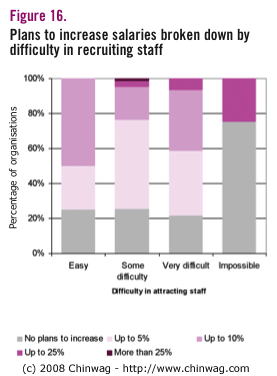
Conclusions
The results of the survey clearly show that recruiting and retaining staff was painful in 2007, with 97% of companies reporting difficulties. Despite and perhaps because of the rude health of the digital economy, 75% of employers are expecting things to get worse in 2008.
The digital sector's rapid growth of the last few years is in danger of being undermined by this shortfall in skilled people. A cooling of the wider economy is likely to further fuel this growth as companies look for more efficient ways of doing business and cutting costs.
With over half (57%) of survey respondents citing that growth issues were related to recruitment problems, the ability to cope with the growing business may hang in the balance. Inside businesses with staffing issues, the increased pressure may lead to a negative loop where staff leave in search of a more relaxed working environment, placing more stress on the remaining personnel.
Left uncontrolled, this can lead to successful companies bleeding staff and finding it difficult to deliver projects. From the survey, one-fifth of companies who'd experienced problems in 2007 believe their viability may be affected by staff problems in 2008. This threat to the UK's digital sector could prove a boon for outsourcers with the ability to win and manage UK-based projects.
The difficulty in attracting high calibre candidates will force companies to focus on their reputation, conditions, benefits, salary and environment namely, their brand as an employer. Whilst 75% of companies are planning to increase salaries in 2008, it's critical the industry doesn't forget the lessons of the 2001 dotcom bust where rampant wage inflation contributed to unsustainable costs.
Unsurprisingly, freelancers are doing well from the shortage of skilled staff. Firms reported using more freelancers in 2007 than previous years, however in 2008 larger firms are reporting little or no increase in freelancers, which may indicate a tendency towards hiring permanent staff or outsourcing. The climate across the sector seems unlikely to dampen the enthusiasm of skilled workers to head down the freelance route in 2008.
Although the sector is still relatively young, the lack of well-defined
career development needs to be addressed to ensure that this skills gap is
filled as quickly as possible. Closer ties with academia, better professional
development and government and industry-funded efforts like Skillset's academies
are all desperately needed both to bring new candidates into the industry and
re-train skilled staff from other industries.
Direct Comment from the Industry
"Do you have any other comments, thoughts or suggestions about the state of digital skills or recruiting - we'd love to hear them..."
Money
"It's really difficult for small companies to get top candidates because we cannot compete on salaries."
"Salary expectations are rising but companies aren't willing to pay the going rate"
"Quality candidates come at a price, and not always the budgets stretch to this. As a consequence, growth can be hindered."
Location
"We are based outside of London so we find it difficult to find experienced members of staff (most seem to be based in London or major cities). We combat this shortfall by offering intense training in-house, but it would be great to find a bigger pool of skilled candidates to select from."
"It's very difficult to find web producers with design and project management skills in Oxford"
"What shortage? Up here in Edinburgh we are bombarded with CVs of quality, highly qualified - and yes, even - able people every day - not just from the UK, but places like Poland and Russia. It's our job to edit and decide who's suitable for commercial reality, but there is no shortage of likely candidates."
"It's too easy for staff to change agencies in London. Being based in Bristol it is more difficult for us to attract more senior staff in the area as they are fewer in number, but easier to retain. "
"Once you add location to the mix, the challenge is even greater than the one felt in central London!"
Lack of Skills
"We recruit in the digital media space. We have had a number of roles from clients this year that we have not been able to even submit CVs on as we have not been able to find the right calibre of candidate. "
"It is truly frustrating that as a company with a fantastic client base and plenty of work that we can not find anyone competent enough to work here."
"There is too much work and a severe shortage of decent designers."
"Skills are in short supply at the moment and it's because of this that so many staff are going freelance. They can make more money that way than we can offer in salaries."
Outsourcing
"We are increasingly looking abroad for recruits. Recent hires from Australia, Spain, South America and Sweden have been successful - living in London is also often seen as a perk."
"We use a lot of freelance resource. It's extremely hard to find good developers, by which I mean people who give accurate quotes, accurate deadlines, stick to them, and deliver to an acceptable quality standard. Forget "you can only have 2 out of cheap, fast and good" - sometimes it seems you're lucky if you get even one of those."
Lack of Flexible Working
"There is a huge workforce out there made up of skilled professionals, in their mid 30's with 10 years plus experience. If more employers took a step back and thought how they could accommodate parents by embracing a more flexible way of working then they might find better, happier and more appropriate staff."
Methodology
This short survey was designed to gauge feedback from all types of company who employ staff working within the digital sector. The respondents were self-selecting from the audience across Chinwag’s network of websites and links from high-profile industry blogs.
Details about the survey:
- The Chinwag Jobs Digital Skills Survey was open from 29th November to 19th December 2007
- Survey responses were collected from 211 people
- All surveys were completed anonymously
About Chinwag Jobs
![]() This report has been created by Chinwag Jobs, the leading recruitment website for Online Marketing, Digital Media, Web, Design and Technical positions in the UK. The site is used by major corporations including the BBC,
Google,
Yell, Vodafone, Yahoo!, Amazon, SEGA and the majority of recruitment agencies who place staff in the sector.
This report has been created by Chinwag Jobs, the leading recruitment website for Online Marketing, Digital Media, Web, Design and Technical positions in the UK. The site is used by major corporations including the BBC,
Google,
Yell, Vodafone, Yahoo!, Amazon, SEGA and the majority of recruitment agencies who place staff in the sector.
Chinwag Jobs is a division of Chinwag, the company that provides Internet-based community forums, websites, email newsletters and consultancy for the new media industry.
For further information, contact:
Sam Michel – sam-at-chinwag.com
Managing Director, Chinwag
Tel: +44 (0)870 730 7313
![]() This
report is also available to download as a PDF (2.5Mb).
This
report is also available to download as a PDF (2.5Mb).
Registration required (it's free though).

